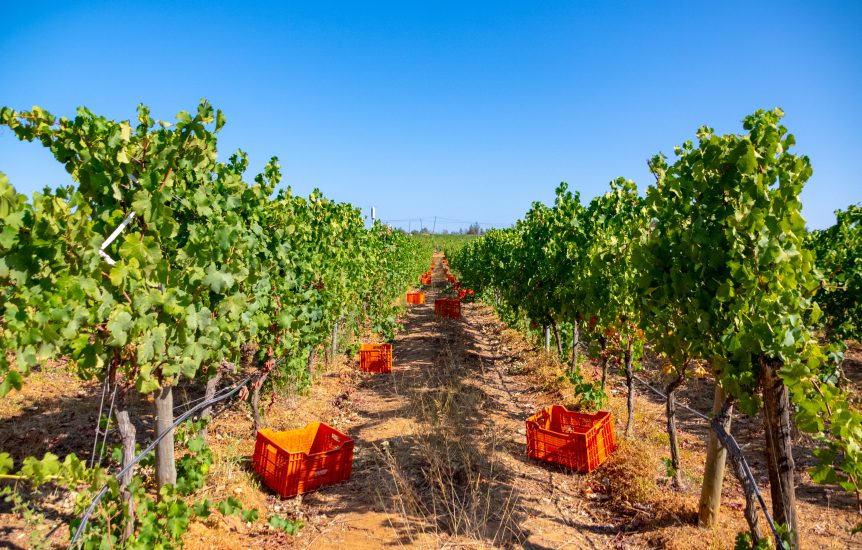- No products in the cart.
It was on an August morning, with the sun rising early and strong over the Algarve plains, that we joined the harvest at Páxa Wines. The golden light lit up the vineyards and the silence was broken only by the sound of shears cutting through ripe bunches. At our side, winemaker Duarte Raimundo guided us with the calm assurance of someone who knows every row of vines, every curve of the land. There was an urgency to pick, but also a respect for nature’s pace, a balance between haste and contemplation.
The Algarve, so often remembered for its beaches and rugged coastline, also preserves in its vineyards one of the region’s oldest memories. Long before tourism, wine was already part of this landscape. Historical records tell us it was here that Phoenician travellers from the East first brought vine cultivation to what would become Portugal. That heritage remains alive in the fertile soil, in the climate where sea and hills converge, and in the wisdom of those who have learnt to read the signs of the vineyard.
At Páxa Wines, this Algarvian legacy comes alive in a complete range of wines, from robust reds to elegant whites, and fresh, vibrant rosés that reflect the region’s brightness. Each wine’s character is born from the interplay of the Algarve’s climate, marked by intense sunshine and proximity to the sea, with the technical care that ensures balance and authenticity in every bottle. As Duarte Raimundo put it, “the harvest is far more than the picking of grapes; it is a time of deep connection with nature, with human endeavour, and with tradition.” Among this diversity is also the revival of Negra Mole, a nearly forgotten native grape variety that, now part of their portfolio, reinforces the bond between tradition and innovation.
The harvest is only the first chapter of a long journey. After picking, the bunches head to the winery, where tradition meets technology. We witnessed the moment grapes are sorted, crushed, and release their generous juice, and saw the tanks where the transformation begins. Imposing, silent stainless-steel vats hold the wine at different stages: some destined for red fermentation, others for white. Among hoses, valves, and thermometers, the alchemy unfolds, turning fruit into bottled history.
For the winemaker, one of the most symbolic moments of harvest is “that instant when the first basket of grapes arrives at the winery.” It marks the transition from field to winemaking, summing up months of work, patience, and anticipation, and the point where the hands that picked join with those who will craft the wine.
But beyond all the technique, there is always poetry. Wine is born of human gestures, of the winemaker’s choices, of care in every detail, and of teamwork in the fields. “The atmosphere at harvest time is very particular,” says Duarte Raimundo, “a blend of hard work with a festive spirit, where camaraderie and mutual help are ever-present.”
The challenges, however, are many: the hot, dry climate, water management, and the need for seasonal labour. “Harvesting in the Algarve has very distinctive traits, and with them, some well-defined challenges,” the winemaker points out. “But each bottle that leaves here is also proof of our ability to adapt and to endure.”
That resilience is equally reflected in their care for the terroir. “Looking after the terroir is almost like caring for a living heritage. It’s not only about producing grapes, but also about preserving the identity of a place,” emphasises Duarte Raimundo, highlighting sustainable farming practices and respect for native varieties as pillars of the future.
And the future, in the face of climate change, is at once a challenge and an opportunity. “It’s a time for reinvention,” he says. “Vine cycles are changing, water management is changing, but new possibilities also arise to create different wines, without ever losing authenticity.”
Walking through the Páxa winery, one feels that wine is not merely a product: it is culture, identity, and the way the Algarve tells its story to the world. In every barrel and every vat rests not only the fruit of the land, but also the dedication of those who believe the Algarve deserves to be recognised as a great wine region.
As the sun climbed higher in the sky, it became clear that harvest is both a celebration and a responsibility. Celebration, because it marks the culmination of months of dedication and, as the winemaker says, “at the end of every harvest there is always a toast, a ritual symbolising the success of the new vintage.” Responsibility, because each bottle that leaves carries with it the image of the region.
Today, Algarve wines are enjoying a renaissance. Páxa is an example of this renewed energy, one that values authentic varieties, respects the land, and commits to quality. In Duarte Raimundo’s words, “the harvest holds a central and symbolic place in the Algarve’s identity, because it represents the ability to adapt, to endure, and to draw the best from the land.”
And for those who wish to bring this story to their own table, a visit to Mar d’Estórias is all it takes, where Páxa wines are available. Because tasting a glass is also travelling to the vineyard, feeling the strength of the August sun, and discovering the Algarve’s well-kept winemaking secret.

